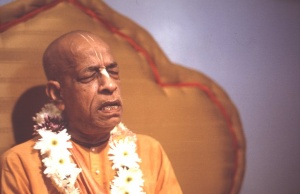CC Madhya 9.270 (1975): Difference between revisions
(Vanibot #0027: CCMirror - Mirror CC's 1996 edition to form a basis for 1975) |
(Vanibot #0020: VersionCompareLinker - added a link to the Version Compare feature) |
||
| Line 2: | Line 2: | ||
<div style="float:left">'''[[Sri Caitanya-caritamrta (1975)|Śrī Caitanya-caritāmṛta (1975)]] - [[CC Madhya (1975)|Madhya-līlā]] - [[CC Madhya 9 (1975)|Chapter 9: Lord Śrī Caitanya Mahāprabhu's Travels to the Holy Places]]'''</div> | <div style="float:left">'''[[Sri Caitanya-caritamrta (1975)|Śrī Caitanya-caritāmṛta (1975)]] - [[CC Madhya (1975)|Madhya-līlā]] - [[CC Madhya 9 (1975)|Chapter 9: Lord Śrī Caitanya Mahāprabhu's Travels to the Holy Places]]'''</div> | ||
<div style="float:right">[[File:Go-previous.png|link=CC Madhya 9.269 (1975)|Madhya-līlā 9.269]] '''[[CC Madhya 9.269 (1975)|Madhya-līlā 9.269]] - [[CC Madhya 9.271 (1975)|Madhya-līlā 9.271]]''' [[File:Go-next.png|link=CC Madhya 9.271 (1975)|Madhya-līlā 9.271]]</div> | <div style="float:right">[[File:Go-previous.png|link=CC Madhya 9.269 (1975)|Madhya-līlā 9.269]] '''[[CC Madhya 9.269 (1975)|Madhya-līlā 9.269]] - [[CC Madhya 9.271 (1975)|Madhya-līlā 9.271]]''' [[File:Go-next.png|link=CC Madhya 9.271 (1975)|Madhya-līlā 9.271]]</div> | ||
{{CompareVersions|CC|Madhya 9.270|CC 1975|CC 1996}} | |||
{{RandomImage}} | {{RandomImage}} | ||
==== TEXT 270 ==== | ==== TEXT 270 ==== | ||
| Line 27: | Line 26: | ||
<div class="translation"> | <div class="translation"> | ||
" 'A person who is a devotee of Lord Nārāyaṇa is not afraid of a hellish condition because he considers it the same as elevation to the heavenly planets or liberation. The devotees of Lord Nārāyaṇa are accustomed to seeing all these things on the same level.' | |||
</div> | </div> | ||
| Line 34: | Line 33: | ||
<div class="purport"> | <div class="purport"> | ||
This is a verse from Śrīmad-Bhāgavatam ([[SB 6.17.28]]) regarding the personality Citraketu. Once when Citraketu saw the goddess Pārvatī sitting on the lap of Lord Śambhu (Śiva), he criticized Lord Śiva for being shameless and sitting just like an ordinary man with his wife on his lap. For this reason Citraketu was cursed by Pārvatī. Later he became a demon named Vṛtrāsura. Citraketu was a very powerful king and a devotee, and he could certainly retaliate even against Lord Śiva, but when Pārvatī cursed him, he immediately accepted the curse with a bowed head. When he agreed to accept this curse, Lord Śiva praised him and told Pārvatī that a devotee of Lord Nārāyaṇa is never afraid of accepting any position provided there is a chance to serve the Supreme Personality of Godhead. This is the purport of nārāyaṇa-parāḥ sarve na kutaścana bibhyati. | This is a verse from Śrīmad-Bhāgavatam ([[SB 6.17.28|6.17.28]]) regarding the personality Citraketu. Once when Citraketu saw the goddess Pārvatī sitting on the lap of Lord Śambhu (Śiva), he criticized Lord Śiva for being shameless and sitting just like an ordinary man with his wife on his lap. For this reason Citraketu was cursed by Pārvatī. Later he became a demon named Vṛtrāsura. Citraketu was a very powerful king and a devotee, and he could certainly retaliate even against Lord Śiva, but when Pārvatī cursed him, he immediately accepted the curse with a bowed head. When he agreed to accept this curse, Lord Śiva praised him and told Pārvatī that a devotee of Lord Nārāyaṇa is never afraid of accepting any position provided there is a chance to serve the Supreme Personality of Godhead. This is the purport of nārāyaṇa-parāḥ sarve na kutaścana bibhyati. | ||
</div> | </div> | ||
Latest revision as of 21:00, 27 January 2020

A.C. Bhaktivedanta Swami Prabhupada
TEXT 270
- nārāyaṇa-parāḥ sarve
- na kutaścana bibhyati
- svargāpavarga-narakeṣv
- api tulyārtha-darśinaḥ
SYNONYMS
nārāyaṇa-parāḥ—persons who are devotees of the Supreme Personality of Godhead Nārāyaṇa; sarve—all; na—never; kutaścana—anywhere; bibhyati—are afraid; svarga—in the heavenly planetary system; apavarga—on the path of liberation; narakeṣu—or in a hellish condition of life; api—even; tulya—equal; artha—value; darśinaḥ—seers of.
TRANSLATION
" 'A person who is a devotee of Lord Nārāyaṇa is not afraid of a hellish condition because he considers it the same as elevation to the heavenly planets or liberation. The devotees of Lord Nārāyaṇa are accustomed to seeing all these things on the same level.'
PURPORT
This is a verse from Śrīmad-Bhāgavatam (6.17.28) regarding the personality Citraketu. Once when Citraketu saw the goddess Pārvatī sitting on the lap of Lord Śambhu (Śiva), he criticized Lord Śiva for being shameless and sitting just like an ordinary man with his wife on his lap. For this reason Citraketu was cursed by Pārvatī. Later he became a demon named Vṛtrāsura. Citraketu was a very powerful king and a devotee, and he could certainly retaliate even against Lord Śiva, but when Pārvatī cursed him, he immediately accepted the curse with a bowed head. When he agreed to accept this curse, Lord Śiva praised him and told Pārvatī that a devotee of Lord Nārāyaṇa is never afraid of accepting any position provided there is a chance to serve the Supreme Personality of Godhead. This is the purport of nārāyaṇa-parāḥ sarve na kutaścana bibhyati.